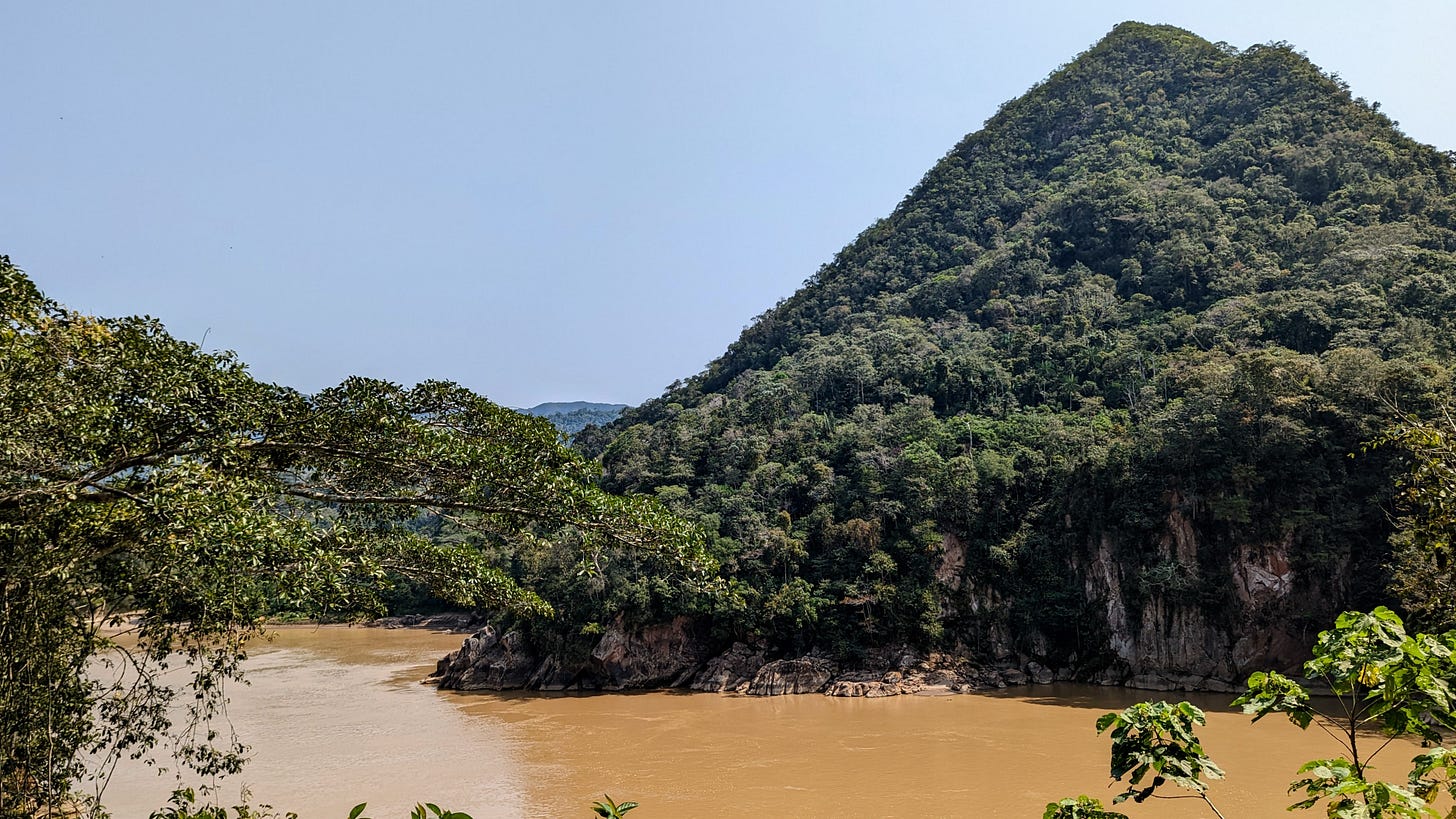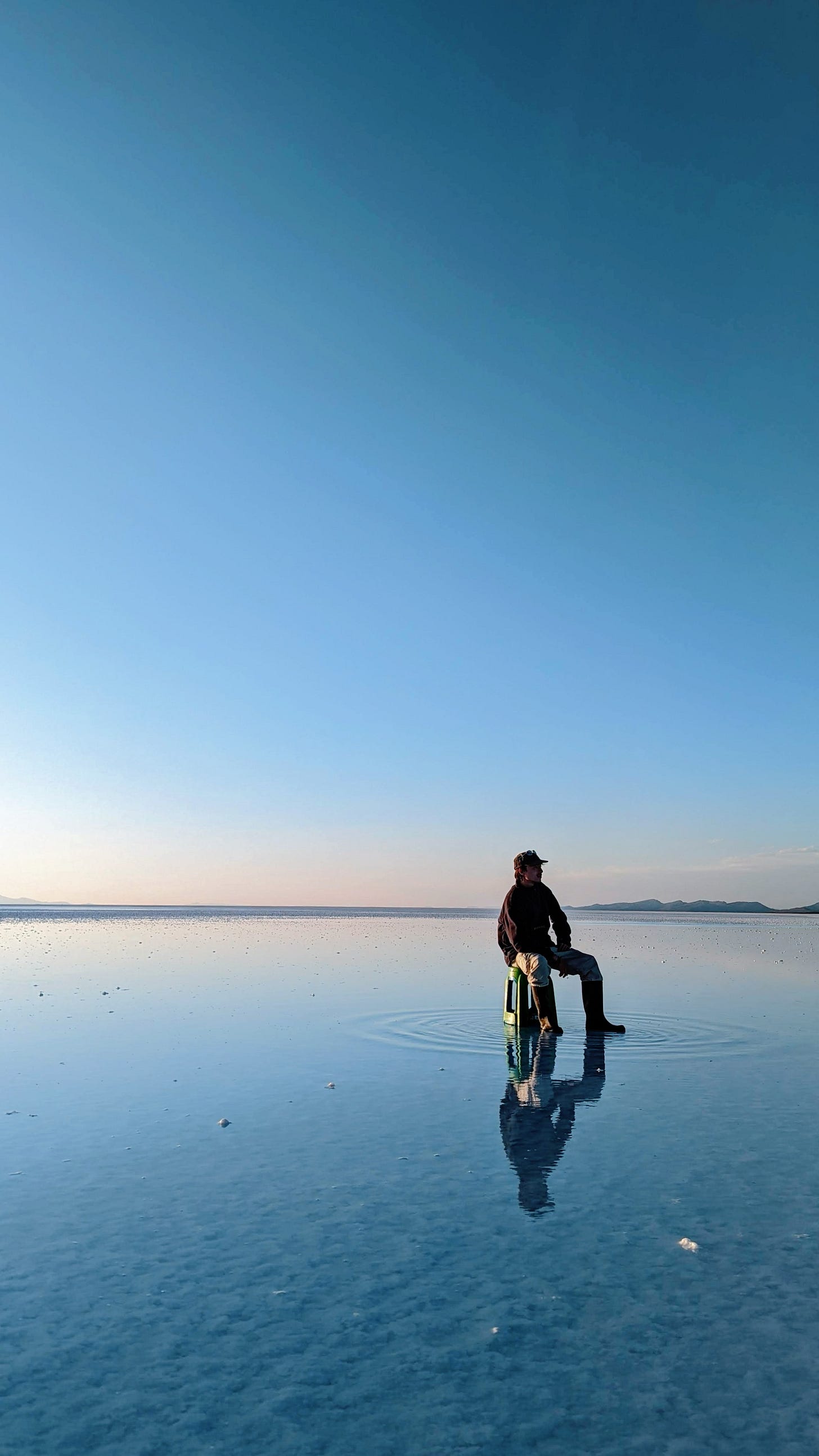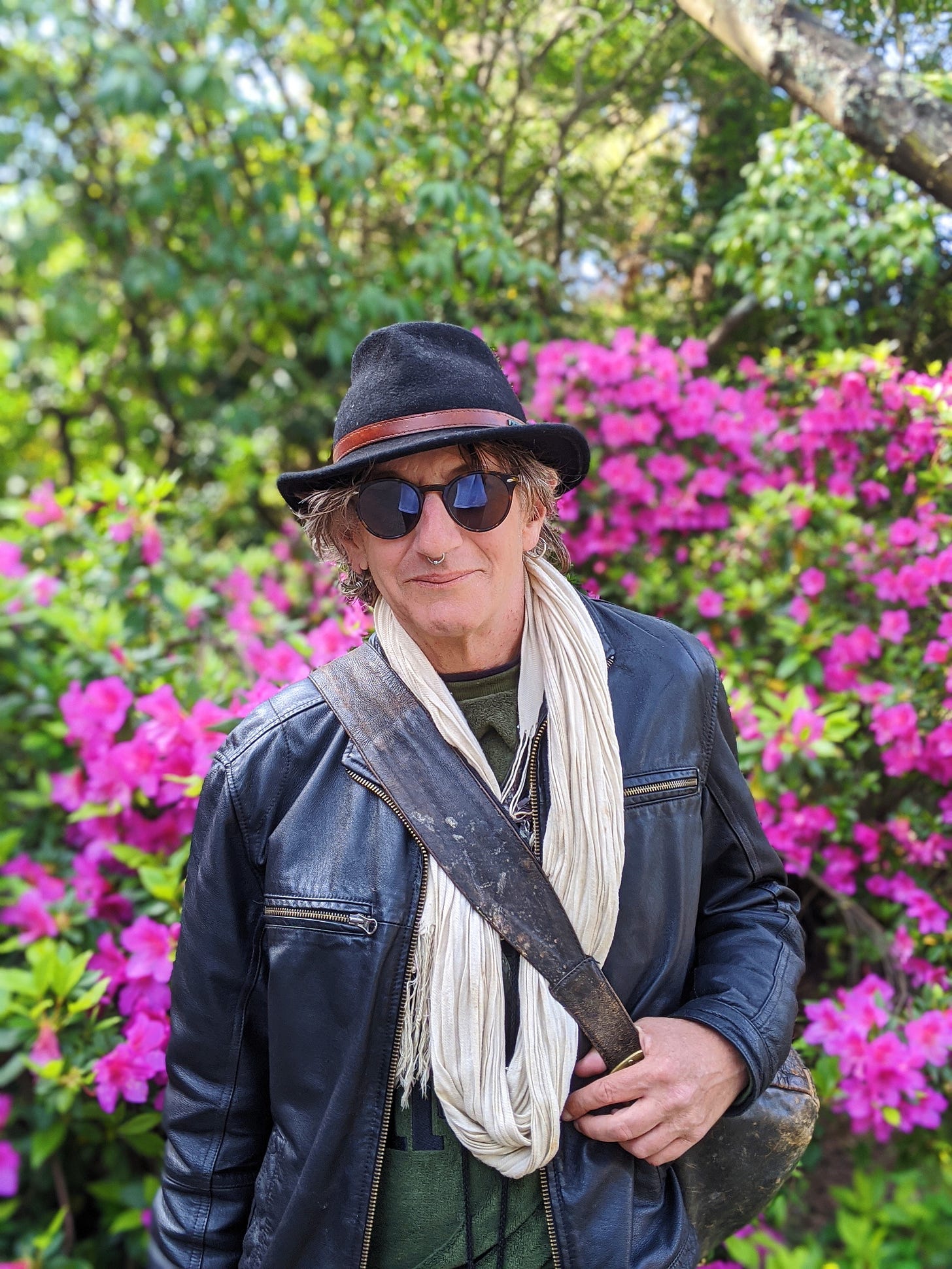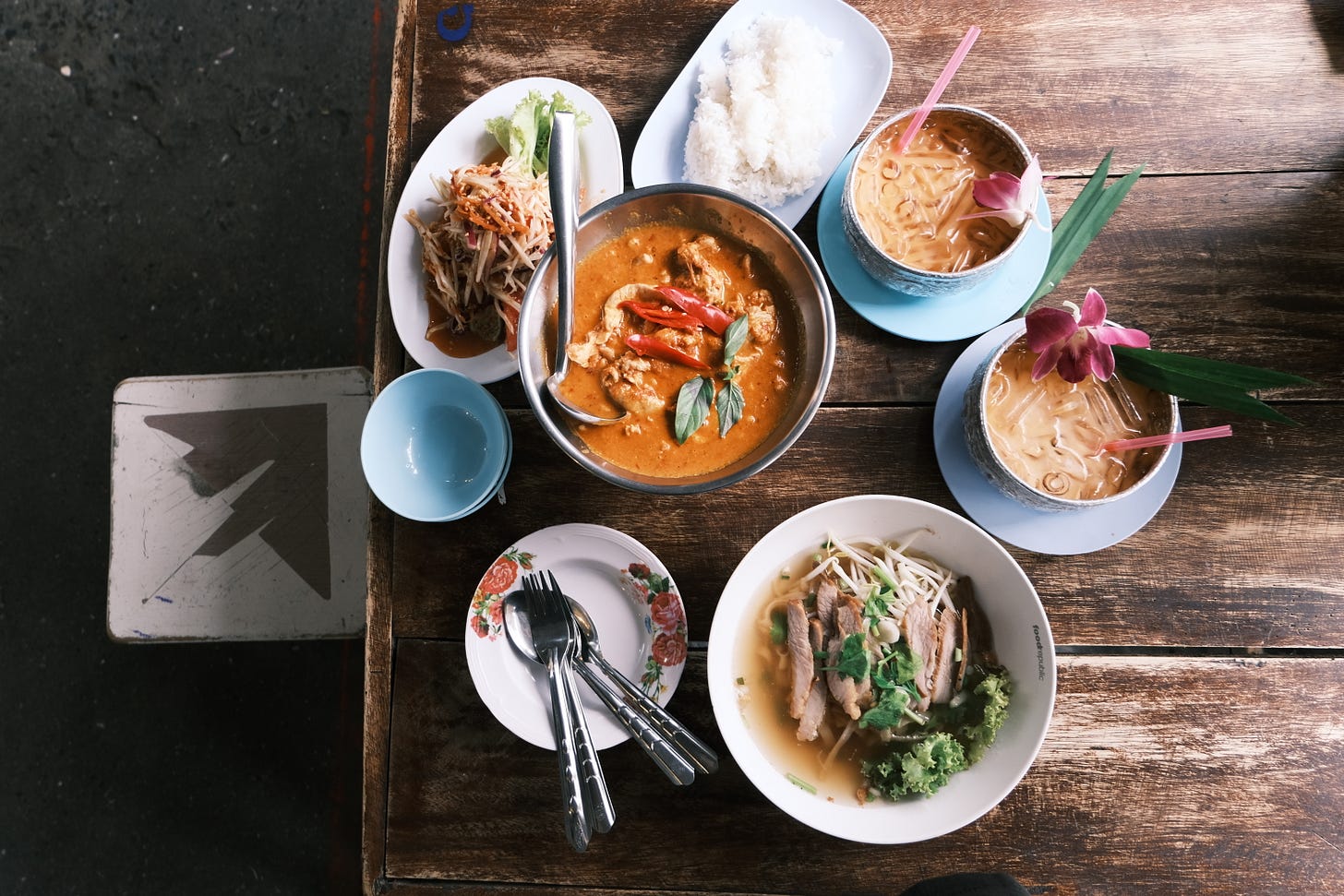DON'T TRAVEL BEFORE READING THIS
We've been robbed of adventure for too long. It's time to take back the travel space for ourselves.
Tian Franklin, author of The Anthropology of Travel
“I give you the mausoleum of all hope and desire… I give it to you not that you may remember time, but that you might forget it now and then for a moment, and not spend all of your breath trying to conquer it”.
- The Sound and Fury, William Faulkner
We’ve all broken our promise to ourselves
A couple years ago, we were liberated from our homes, free to travel wherever we like. Carpe diem—the post-pandemic epoch of time started with a bloodthirsty desire to be sure that we were all living our lives to the fullest.
Has that exactly come to fruition? I doubt it. I remind you that, when you were locked away at home, you experienced the sense of mortality that came with the fraught feeling of your life being unlived when faced with the potential end of it. I felt it, too. It was a mid-life crisis for us all.
But are we expected just to go back to the same routine? Check into the same old resorts and waste away on the beach? Take the same package deals and fall for the same tourist traps? Are we really that predictable? What we realised back then was that we hadn’t pushed ourselves enough – hadn’t done enough, hadn’t seen enough, hadn’t explored, hadn’t ventured into the vast unknown.
Quite frankly: that we hadn’t lived.
We all had some childhood dream of being that great explorer: a fur trapper out in the wild, a frontiersman following the sunset, an astronaut, an Indiana Jones or Amelia Earhart. That was a primal instinct pulling on our heartstrings to venture deep into the abyss of the unknown, built into the psyche of our evolution from the great leap of microscopic bacteria jumping from one volcanic tidepool to the next, to monkeys swinging across the magnanimous canopies of prehistoric times. In present, it comes to you, begging to escape the mundane and experience something exhilarating, something breath-taking.
Does ‘travel’ as we know it, as you might experience it, scratch that primal itch for adventure that lays inextricably deep within your soul?

Travelling is the joy of exploring. It is rekindling that nostalgic feeling we had as children of being in an unknown mystery wherever we looked, when we had no concept of time or reality. It is learning about new cultures, flung to a place so alien that we question everything about ourselves. It is being transported to a world apart and experiencing what we never could have imagined existing. But with all the global hotels, luxury beach resorts and tourist packages, the true art of travelling has been invariably lost to those for whom it is merely a business of numbers. The travelling industry has streamlined itself into providing a familiar luxury allure of travel. Fundamentally seeing the tourist as a single entity, they send back millions of tourists year-in-and-year-out with ultimately the same experience as the next person. They rob you of the adventure your hungry heart needs.
But it doesn’t have to be so: travelling starts and ends with you. You can be the master. It’s time you get what you deserve to experience. I’m here to share the art of not knowing, of one-way tickets and joy derived from risk. Of struggling with different languages and alien cultures, which beat you down to size and leave you born anew. I’m here to praise the art of irresponsibility. For, in the end: to be ‘responsible’ is to embody the expectations of another; to be ‘irresponsible’ is to embody those of no one else but your own. Are you ready to listen to what your soul truly wants?

It’s time to reimagine how to travel
I’m not your standard travel ‘blogger’. In fact, I lament the thought of anyone ever calling me that. I don’t flick through hotel booking sites trying to find the best four-star deal with a comforting continental breakfast and the safety of BBC from your suite’s television before setting off to Rome. I don’t go on some agency’s planned city tour delivered in flat-tones to see the sites of the Colosseum, the Pantheon, and Trevi fountain before retreating to the safety of the nearest Starbucks with my notes and a pumpkin-spiced latte in hand to write about how to build this into your itinerary. Hell, if I went to Rome, I would probably manage my time so badly that I would never get round to the Colosseum. I’m too busy taking side alleys, the wrong buses, getting lost and refusing to use my phone to re-orientate myself, talking to as many locals as I can—not just having a good time but humanising my experiences. I don’t spend each day looking for home comforts and travel luxury; I’m on the local diet. When in Rome: I’d rather do as the Romans do.
That’s because I see the current travel space as no less than the redressing of a neo-colonial experience of the world carefully curated by Western industries, manipulating you to tread on the same ground that millions of travellers around you walk on year-in-and-year-out. From the moment you conceive the idea where your next travel destination will be (taken from an over-filtered Instagram travel account advertising photos of serene views splashed with unimaginable lakes of celeste blue), to scrounging through websites filled with comparisons of American hotels, to crafting an itinerary from resort reception leaflets and the top recommended restaurants on review sites offering not-so-local cuisine: Western institutions are with you every step of the way, giving you what they want you to want.
I’m not in that business.
Let’s face it: the common traveller is likely going to be from a European or North American nation. The tourism industry reflects that: your hotel comparison sites, apartment and villa rentals, car-for-hire conglomerates, are all Western businesses that claim they cater to the experience of travel as the only legitimate way about it, but, ultimately, leave you with something pre-packaged and comfortable – leaving you none the wiser from what could have been an eye-opening experience. They give you the safety of a metaphorical Western lifejacket to save you from drowning in the vast seas of culture around you (heaven forbid)! You are left with a one-size-fits-all experience that you take as the break you needed from the monotony of everyday working life. But, hey ho, that’s the point of travel, isn’t it?
Said who?
The truth is that Instagram photo you saw of the stunning, coloured mountains of Peru was photoshopped to a point where you wouldn’t be able to say that what you saw in the photo actually existed without having to say three Hail Mary’s afterwards. The deal for that stunning holiday apartment in Barcelona you snagged is one of over 22,000 in the city that are creating soaring rent prices for families who have lived there for generations. The luxury hotel you stayed in required the clearance of pristine beach-side rainforest or even families of a fishing community which lasted millennia. Embroidered hotel slippers; overly packaged one-guest-one-use toiletries; tiny containers of milk that you only seem to see in a hotel suite, all add enormously to the pollution in those same stunning areas of the world. It is simply the manifestation of the society of the spectacle, the malformed imaginary of travel that only leaves a path of destruction in its wake.
When I was in the Dominican Republic, I walked alone down isolated streets in the heart of town. Huge walls, two metres high, lined every street. Pale white, they blended in with the clouds above, creating a complete absence of presence. The roads were devoid of life, bar the occasional bursts of a splash from a pool or joy of a child’s laughter from over the wall. Professor Uma Kothari once wrote “the enclavic resort hotel exemplifies the continuing salience of tourism as a realm of colonial representations”; they are literally the division of a community between native and non-native – the fundamental creation of dystopia for the sake of pleasure and relaxation. On the other side, I saw a community suffering to make ends meet. Food prices in locals’ cafes that were through the roof. Water insecurity. Nutrition insecurity. Two lives, worlds apart, separated by a wall. I didn’t stay in a resort; I sided with the locals.
What happened to the anthropology of travel? To the idea of travel serving to completely open your eyes to something you could never have imagined and returning with the wisdom of experience and introspection about who we are as individuals and a collective? Why did anthropology and immersion into a culture have to die? “Because the entire world has already been discovered” those I ask often reply. That may be true, but isn’t the learning experience of anthropology relative to what the individual knows, and not what humankind knows as a whole? To put it in blunt terms: only one as all-knowing as God is insulated from anthropology; I may speak English, but that doesn’t mean that I have stored the entire Oxford Dictionary in my head. The unknown always exists, and the beauty of life is crafting your own path through it any way you want, and never having it given to you. Grant yourself the euphoria of the human experience, for we live to experience, and we experience to live. I hope, over time, sharing mine may inspire you to create your own.
I want to turn all the rules on its head. No more tourist trap lists, reviews of culturally irrelevant experiences or guides for Western comforts away from home. After spending a few minutes with me, all you’ll want is to simply resign yourself wholeheartedly to your dream destination and search for those experiences which give you perspective on who we are as humans. You’ll be booking one-way tickets and planning as little as possible. You might even be arriving at your destination without a suitcase or reservation. For the joie de vivre of travel is not to seek a luxury experience, but to shed that skin of comfort and familiarity, drowning in culture and difference, pushed in ways you didn’t know were possible. After all, we are all a product of our experiences, and your new freedom pass will reflect on all areas of your life.
How The Anthropology of Travel will make you an autonomous traveller
It’s time to light the true fire within you that is burning to learn more about the world - to question who we are as humans and to learn about our beauty and differences. To teach your eye to spot the diamond-in-the-rough local restaurants and establishments that your tourists’ eye has been trained to miss. You’re going to learn the joy of diving into the deep end, where you’ll be learning things about yourself and the world you didn’t know existed. You are guaranteed to resurface with the self-found gift of becoming a completely autonomous traveller.
The Anthropology of Travel is my project designed to empower you. I aim to put the writing back into travel writing in the 21st century media space so you can meaningfully connect with social narratives across the world. This means emotive, first-person accounts of travel that inspire you to be introspective, to reflect and to grow. I will also share insights into the crucial philosophy that I abide by to ensure that I meaningfully connect with the culture and community. I’m also excited to announce the upcoming podcast to fill the void in the travel genre lacking in compelling storytelling and cultural reflections. Like short stories from an audiobook, the Anthropology of Travel podcast will be an immersive experience with real ambience recorded from my trusty field recorder so you can truly engross yourself in travel at its most valuable. There is also a lot more in the works slated for the next few months seeking to fill voids in the travel industry, such as catalogues and guides that recognise community businesses, landmarks, and experiences by their degree of cultural preservation and traditional practices. But I shall leave this for another day. For now, consider following us on TikTok or Instagram for daily updates on what we’re doing!
You’ll definitely want to stick around.
My tips as the autonomous traveller
My first day in Portugal, a solo trip, I landed without a single recommendation or idea of what I was in for. All I had along with my toothbrush was some basic Portuguese culled from one hour of Rosetta Stone and a school-era backpack of clothes. In my first hour, I was accosted for a cigarette by an old man with ragged clothes and ended up being taken to one of the most famous cafés for locals to have a coffee, a bottle of wine, and a three-course meal with the main being a bean soup of cow intestines, other unidentifiable organs, and even, at least I think, an ear. A delicacy of the North created by expelled Jews living in the north-eastern mountains of Portugal centuries ago, he told me. And all this for no more than five euros. I experienced the infinite arsenals of wisdom of my newly found companion, and I learnt that he was the most famous underground beatnik poet in Portugal, highly recognised within the field of literature and theatre. Over the following eight months (I got caught in lockdown), he showed me the punk, anarchist world of Portugal taken straight from the 70s and still going strong today. I ended up passing time in illegal, underground bars (literally more often than not being situated underground), where clouds of smoke clung to the ceiling, and everyone played music and recited poetry until three in the morning. Don’t be put off by the idea of travelling solo but get drawn to it; you’ll quickly learn that you’re never going to be alone.

Learning the native language of where you’re travelling enough to carry some conversation is infinitely important. Why should another country have to change for you when you are in their territory? Speaking the language, and using it to ask people questions about their culture and history, does not just show the people of the nation you’re visiting that you are making an effort, but allows them to see something in you that they seldom see in tourists: someone looking to learn from their culture, and not to use it as a novelty in order to have fun. Often, locals feel that tourists are only taking away from their culture and tradition by trivializing it as such. Going against the grain benefits not only you but leaves locals happy to host you. It is enriching for all.
Avoid fancy hotels. In fact, avoid the idea of ‘fancy’ all together. Remember: you’re trying to avoid comfort in order to have a true adventure. Stay in hostels but don’t get too drawn into hanging out with the other guests. The more that foreigners group together the more distant from the local culture you will all become. No swanky bars and restaurants with English menus and tourists dining out front by candlelight. Don’t judge a restaurant by the quality of its façade; the uglier, in many cases: the better. These establishments run on nothing less than authenticity and excellence: the food is genuinely local, not just representative of the cuisine, but of what locals would eat daily. This is an important distinction to make; Malta, for example, has a big reputation for being a culprit of this in the tourism industry. At lunchtime, look at where the workmen with high-vis jackets and labour-dirtied hands eat. Order what they order, and don’t worry about your palette or not being able to read the menu. The beauty of the unknown is the struggle that comes with being displaced. Relish being out of your comfort zone.

Don’t pull out your phone when you get lost – go ask a local. Maybe then you will have the chance to strike up a different conversation with him, which could lead to anything – a free tour of the city, a drink at a local, even dinner at his house cooked by his family, or a free bed for a few days. Trust me; all the aforementioned has happened to me. Don’t look to be treated like royalty but look to find the experiences that you can learn from and take home with you as a newly made individual. The point is: the moment you unify the idea of travel with luxury you miss all the infinite and incredible encounters waiting to happen all around you. You know I am right. For the same price you would pay to stay for a week in that dreamy Côte d’Azur resort you could motorbike across Uzbekistan and the Kazakh steppes for two months.
Adding a philosophy to travel
I’ve travelled to twenty-eight countries. You may say for someone who writes about travel that is not really a high number. However, I am only twenty-five and didn’t have one of those famed gap-year multi-country drinking adventures with my former schoolmates. I also stay somewhere for weeks, if not months, at a time. And, weirdly, a large part of my adult life has been spent living in a pandemic.
I was introduced to the concept of travel at a very young age. I’m a mixed-nationality kid, and I always jetted between the UK and Thailand to visit my family. Travel was always a casual thing; it was never about booking hotels and beaches. It was always a thing of anthropology; after 12 hours I was living and breathing a different culture. Literally, living. It wasn’t accessed through tours, museums and guides, but all around me in my family who relished the chance to make sure I ended up embodying somewhat of a Thai identity. I inherited a concept of travel as ridding myself of everything that is me back home. At twenty, a six-day foray to Portugal spiralled into eight months, resulting in a period of the fastest rate of learning and maturity in my life, a new language half-learned, and the filming of my first documentary which brought me to forgotten villages and narratives all cross the Iberian peninsula. No less than a year later, I found myself on a one-way flight to Brazil, uncertain when I would come back. In 2022 I returned to South America and backpacked from Cartagena to Rio de Janeiro, now with another language under the belt. Today, I sit in the ancient city of Hue, Vietnam, four months into my next adventure.
I learn every day from a tapestry of culture so large it may never be viewed all at once. I benefit every minute from those who have lived so differently to me that their wisdoms are ones I could never myself have attained. I eat the best food I’ve ever had daily in the most informal looking of restaurants that would never pass hygiene tests in Europe. As a result of travelling solo, I have met many individuals, made many friends, and been welcomed into many groups. Through this, I have seen parts of the world no tourist will experience, from the most dangerous favelas to the smallest frontier villages powered by horses and 19th century technology that you could have sworn only existed in living museums. I revel in my insignificance as the solo traveller off the beaten track and live no more than to absorb the lessons of a life and culture completely different to my own.
If you have read this and still want to jet off to Cancun and come back recommending Thai food and chic Spanish tapas restaurant-bars in the modern update of town, be my guest. You’ll only be leaving those who want to experience the cultural potential of travel the right way with more to experience. If you feel emboldened by that primal desire within you to travel the way intrepid explorers of ancient times did, stick around with me. Hear what I have to say about what I’ve experienced since I started doing the same. It’s time to reclaim what it means to be alive.
“Clocks slay time… time is dead as long as it is being clicked off by little wheels; only when the clock stops does time come to life”.
- Meditations in an Emergency, Frank O’Hara
Don’t worry about time, about the length of your hair, about packing enough clothes and makeup. Just go, and never look in the rear-view mirror. Literally. Your plane won’t have one.
The Anthropology of Travel is an alternate travel publication bringing a new philosophy to travel. It was founded by travelling couple Tian Franklin and Caitlin Denton, who quit their jobs in May 2024 to pursue this project. We have some big things planned. For now, the Anthropology of Travel is small and just being started. That’s why we bring it to you on Substack for free. We don’t earn anything from our dream project just yet. If you see the value in what we do, please share this publication with a friend, perhaps pledge to pay one day, or even donate on Buy me a Coffee! All of this will help us find even more time to bring you innovative and new content that breaks the norm. Thank you so much for reading until the end.
Updates to AoT and our adventures, follow our Instagram!
For daily travel videos from a Gen Z perspective, follow our TikTok!






